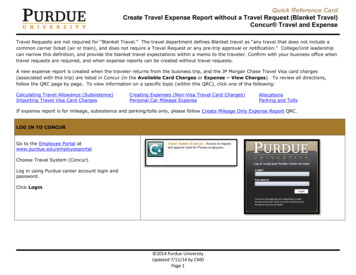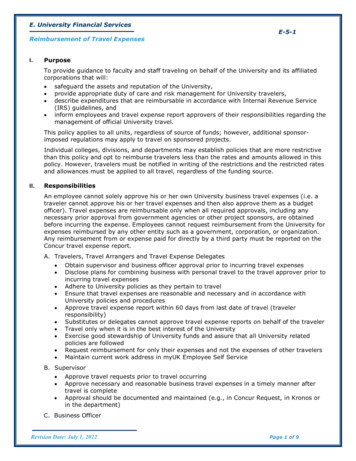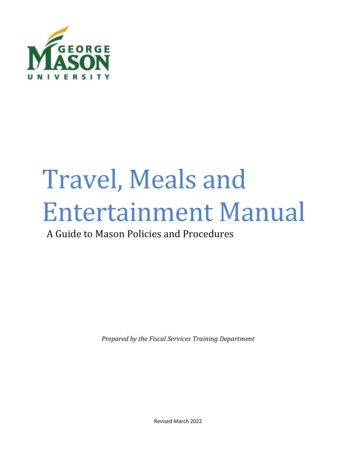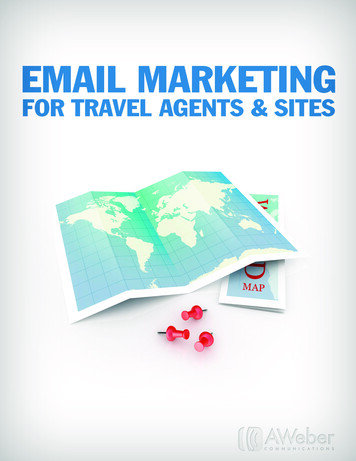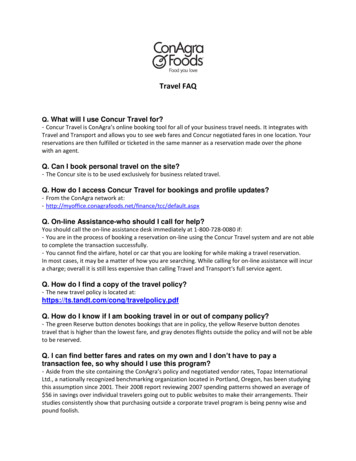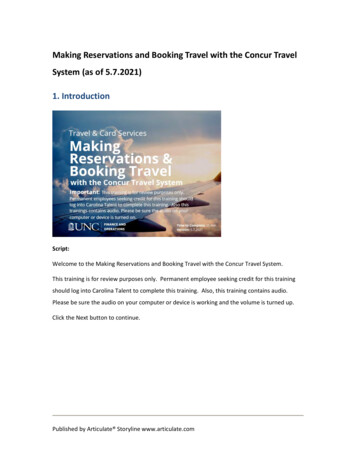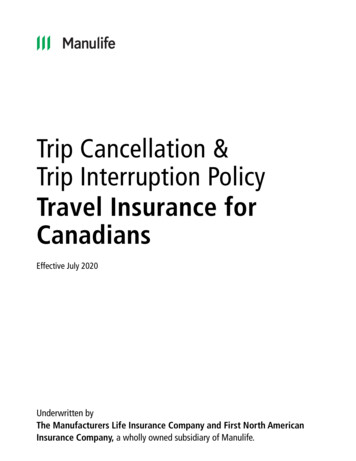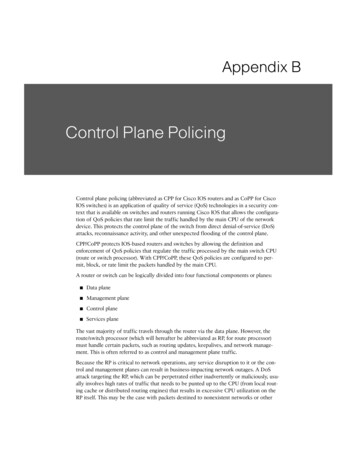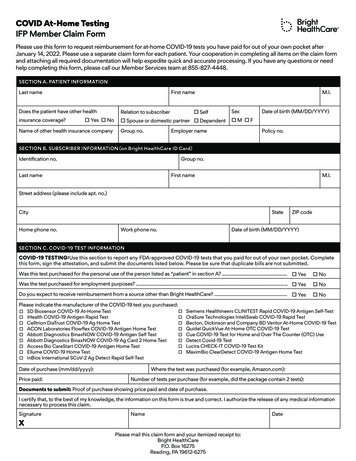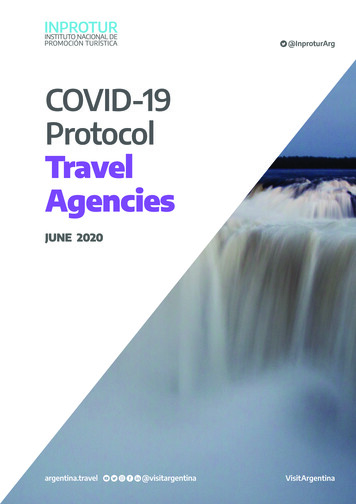
Transcription
@InproturArgCOVID-19ProtocolTravelAgenciesJUNE 2020
@InproturArgCOVID-19 Protocol Travel t ----------CHAPTER 1GENERAL DEFINITIONS & MEASURES1.1. Preventative Measures1.1.1. Information Dissemination1.1.2. Social Distancing1.1.3. Hand Hygiene1.1.4. Respiratory Hygiene1.1.5. Surface Disinfection & Room Ventilation1.2. Measures for the Detection & Managementof Suspected Cases & Close -----------------CHAPTER 2SPECIFIC MEASURES2.1. Facility Personnel2.1.1. Preventative Control131313
@InproturArgCOVID-19 Protocol Travel Agencies---2.1.2. Social Distancing2.1.3. Safety & Hygiene2.1.4. Training2.1.5. Commuting2.1.6. Identifying Personnel at Risk2.1.7. Work Organisation2.1.8. Crisis Committee2.2. Customer Service2.2.1. Information Services2.2.2. Health Protection Information Management2.2.3. After-sales Service2.2.4. Own or Third-party Services2.3. Facility Areas2.3.1. Space Arrangement2.3.2. Areas for the Movement of People2.4. Receipt of Goods3141414151516171717181920202021212.5. Cleaning & Disinfection2.5.1. General Cleaning & Disinfection2.5.2. Restrooms232.6. Maintenance Work232.7. Waste242222
@InproturArgCOVID-19 Protocol Travel ---------------------Faced with the situation posed by the current global health emergency and the economicand social impact such emergency has on tourism, the Ministry of Tourism and Sports of theArgentine Republic, in cooperation with the Argentine Institute for Tourism Quality (Institutode Calidad Turística de Argentina, ICTA), the Argentine Chamber of Tourism (Cámara Argentinade Turismo, CAT), the Argentine Federation of Travel and Tourism Business Associations(Federación Argentina de Asociaciones de Empresas de Viajes y Turismo, FAEVYT) and theArgentine Tourism Council, on behalf of the Argentine provinces, have prepared this “COVID-19Protocol for Travel Agencies.”The guidelines provided in this Protocol, which are based on the recommendations issued bythe Ministry of Health of the Argentine Republic, include several specific measures and stepsto be taken in order to tackle the current situation and help this industry recover. The objectiveof these measures is to protect people’s health and wellbeing.We are currently facing a pandemic (an epidemic that has spread across the world) broughtabout by a new type of coronavirus, SARS-CoV-2, which has been discovered recently and isthe cause of the coronavirus disease or COVID-19.According to the World Health Organization, 80% of those infected with COVID-19 recoverfrom the disease without being admitted to hospital, 15% of infections are mild cases requiringadmission to hospital and 5% of cases require ICU admission. Older adults and people withprior medical conditions, such as high blood pressure, heart or lung conditions, diabetes orcancer, are more likely to develop severe cases.The virus is transmitted from person to person through “Flügge droplets”, that is, droplets thatare expelled from the respiratory tract of a person when they cough, sneeze or talk, and bycontact with contaminated hands, surfaces or objects. This is why it is paramount to keep therequired minimum distance and take all necessary contact precautions.On 12 March 2020, the President of Argentina, Alberto Fernández, issued Emergency ExecutiveOrder No.260 extending the term of the Public Health Emergency status (set forth under Argentine LawNo. 27 541) as a result of the COVID-19 pandemic declaration issued by the WHO. Certain other
@InproturArgCOVID-19 Protocol Travel Agencies---5supplementary Executive Orders and Regulations have been issued since then, owing to thefact that the spread of the virus has varied by province.Under Executive Order No. 520/2020, it was established that the “Preventative & MandatorySocial Distancing Stage” could begin in all regions where there is no community spread ofSARS-CoV-2, while all urban areas where there is community spread of SARS-CoV-2 or whichdo not meet the required epidemiological and health criteria had to remain in the “Preventative& Mandatory Social Isolation Stage.”In this stage, a system is still required for the permanent monitoring of the situation allowing fora follow-up of the evolution of the epidemic in each geographic area based on a set of dynamicindicators selected carefully on the basis of scientific evidence, both for the “Preventative &Mandatory Social Distancing Stage” and the “Preventative & Mandatory Social Isolation Stage.”This Executive Order mandates that applying a 2-metre/6.5-ft. social distancing rule andmandatory face covering wearing, along with keeping a good hand, respiratory and surfacehygiene, are necessary preventative measures to reduce the spread of SARS-CoV-2 fromperson to person.This Order, in force from 8 June 2020 through 28 June 2020, also extended the effective term ofExecutive Order No. 297/20 establishing the “Preventative & Mandatory Social Isolation Stage”through 28 June 2020 as well.The aim of this Order is to allow for the taking of measures to curb the impact of the epidemic ineach jurisdiction while, at the same time, facilitating a gradual reopening of economic activities.Compliance with these preventative measures, along with an early detection of infection signsand symptoms and the early diagnosis, isolation and prompt treatment of suspected andconfirmed cases, while taking care of the families, cohabiting partners and other close contactsof those infected, are strategies to control the pandemic.Each jurisdiction is applying any measures warranted in their territory. This situation calls forshared responsibilities by all levels of administration, civil society organisations, the communityand every person living in the country, as everything we do as individuals, businesses,organisations and agencies has an impact on collective outcomes.Based on the applicable regulations, this Protocol is expected to lay down shared criteria forjurisdictional authorities to implement their own regulations, provided that such regulationsguarantee compliance with the recommendations and guidelines set forth herein, thus pavingthe way for a “new normal” in the way we do tourism.
@InproturArgCOVID-19 Protocol Travel Agencies---6SCOPEThis document is divided into two Chapters. The first Chapter, “General Definitions & Measures,”lays down the recommendations issued by the National Executive Branch and the Ministry ofHealth of the Argentine Republic regarding preventative measures and the development ofcourses of action to guarantee that social distancing is observed and that procedures for handand respiratory hygiene and surface and room disinfection are applied.The second Chapter, “Specific Measures,” lays down specific guidelines to be followed at travelagencies, which are based on the recommendations set forth in the first chapter while takinginto consideration the specific characteristics of the industry.All recommendations and guidelines set forth in this Protocol shall be applied subject to thestage of the response plan and the measures in place in each jurisdiction nationwide.In sum, several specific measures and courses of action are put forward to tackle the currentsituation and help the industry recover.The main objective of these measures is to protect the health and wellbeing of both industryworkers and tourists.It is essential that all people who are a part of the tourism value chain are prepared for thepost-COVID-19 era, in which traveling and tourism and new consumption behaviour will all betaking place in a “new normal.” This new scenario with which the industry will be faced calls fora comprehensive revision and updating of the operating management of every service.OBJECTIVES Implement measures to protect the health and wellbeing of industry workers and tourists. Help meet the needs of this industry, which has been hit by restrictive measures. Curb and stop the spread of the virus. Guarantee alignment with any social measures recommended or established by the relevantauthorities. Guarantee that tourism-related business can continue operating.
@InproturArgCOVID-19 Protocol Travel Agencies---7TARGET AUDIENCEThe COVID-19 Protocol for Travel Agencies is meant for all such Argentine-based travel agenciesduly registered with the National Bureau of Travel Agencies (Dirección Nacional de Agencias deViajes), under the purview of the Ministry of Tourism and Sports of the Argentine Republic, inorder to guarantee that, on every critical point of the service provision chain, steps are takento prevent the spread of the virus across the community and to protect tourists and industryworkers.
@InproturArgCOVID-19 Protocol Travel Agencies---8CHAPTER 1General Definitions& -----The main health measures introduced in the document titled “Recomendaciones para eldesarrollo de Protocolos en el marco de la pandemia” (Recommendations for ProtocolDevelopment Amid the Pandemic) issued by the Ministry of Health of the Argentine Republicon 11 June 2020 are laid down below. The entire document is available at: f (available in Spanish)1.1. PREVENTATIVE MEASURES---1.1.1. INFORMATION DISSEMINATIONPost in visible spots signs with information on social distancing measures, steps for a goodhand and respiratory hygiene and steps to follow in the event someone exhibits COVID-19symptoms. This information should also be disseminated in other ways (such as on websitesor social media or via email or telephone) to educate workers on the hygiene and safetymeasures taken at the facility. lacion/prevencion (available in Spanish)A dynamic definition of what is considered to be a COVID-19 case is available at: ID-19/definicion-de-caso (available in Spanish)1.1.2. SOCIAL DISTANCINGa) A minimum 2-metre/6.5-ft. distance must be kept at all times. This applies both to workersand to anyone visiting the facility (customers, suppliers, etc.)
@InproturArgCOVID-19 Protocol Travel Agencies---9Social distancing guidelines and measures are implemented and maintained on the basis ofepidemiological and health criteria, subject to the stage of the response plan in which therelevant jurisdiction is and to any applicable higher-level regulations.b) Avoid physical contact and greeting others with cheek-kissing, hugs or handshakes.c) Avoid holding meetings in enclosed spaces, including work meetings and meetings withfamily or friends.d) Avoid sharing beverages (such as the traditional mate), dishware and other utensils.e) “Cloth face covering” wearing does not replace social distancing measures or the need to keepa safe distance from other people, but it may be deemed as a supplementary measure when ata certain moment it is not possible to keep the minimum safe distance. “Cloth face coverings”are reusable cloth devices that must completely cover a person’s nose, mouth and chin and thatare a required as a supplementary measure to reduce COVID-19 spread possibilities. For moredetails on “Cloth face coverings,” visit lacion/barbijo (available in Spanish)f) In order to keep social distancing, room capacity (in conference rooms, offices, cafeterias,kitchens, changing rooms, workstations, etc.) must be limited to 1 person every 2.25 squaremetres/24 square ft. of space meant for people movement. To guarantee compliance withroom capacity limit requirements, businesses can resort to working only with reservations orappointments. Whenever this is not possible due to space constraints, the use of these spacesmust be forbidden.g) If the required minimum safe distance between workstations cannot be kept, businessescan consider installing physical barriers (such as glass screens or partitions) that can be easilyand frequently cleaned. publico frecuentes#distanciamiento (available inSpanish)1.1.3. HAND HYGIENEa) Every person performing duties at qualified facilities must wash their hands frequently andmandatorily: Upon arriving at the workplace
@InproturArgCOVID-19 Protocol Travel Agencies---10 Before and after handling waste Before and after eating, handling food and/or breastfeeding After being in contact with frequently touched surfaces: counters, handrails, door handles,banisters, etc. After handling money or keys or being in contact with animals, etc. After using the restroom or changing diapers After coughing, sneezing or blowing their noseb) To the extent possible, people should avoid touching their face.c) Each qualified facility must have suitable spaces for appropriate and frequent handwashingwith water and soap (liquid/foaming soap dispenser, disposable towels or hand dryers) andprovide 70%-alcohol-based solutions (such as alcohol-based hand sanitiser gel.) publico (available in Spanish)d) Facilities are required to provide adequate and sufficient personal hygiene elements that canbe easily accessed (soap or a water-alcohol solution and paper towels for handwashing.)e) Alcohol-based solutions should only be used on clean hands; otherwise, hands should bewashed using water and soap.f) People should wash their hands frequently for 40-60 seconds at a time. psc lavarse-manos poster es.jpg psc desinfectmanos poster es.jpg (available inSpanish)g) Since the virus can last longer on latex or nitrile, the use of gloves is not recommended otherthan for specific tasks (cleaning tasks, direct contact with secretions.)1.1.4. RESPIRATORY HYGIENEa) People must wear cloth face coverings that fully cover their nose, mouth and chin atworkstations and shared working spaces. Cloth face covering wearing does not replace physicaldistancing or hygiene measures.b) Cloth face coverings should be washed with water and soap at least once a day and bechanged immediately when dirty or wet vailable in Spanish)
@InproturArgCOVID-19 Protocol Travel Agencies---11c) When coughing or sneezing, people should use a disposable tissue or cover their nose andmouth with the inside of their elbow if they are not wearing a cloth face covering. In eithercase, hands should be washed immediately.d) Large rubbish bins with no lid must be placed in all waiting rooms or high-traffic areas forpeople to throw away their used disposable tissues.1.1.5. SURFACE DISINFECTION & ROOM VENTILATIONa) All activity-related applicable regulations on cleaning and disinfection must be compliedwith at all times.b) Surfaces must be disinfected on a daily basis. Surface disinfection must be performed asfrequently as needed based on the movement and gathering of people, the season of the yearand the implementation of any supplementary room ventilation measures.c) All surfaces must be cleaned with water and detergent before disinfection.d) Facilities must provide all the necessary elements for wet cleaning (buckets, mops, cloths,water, detergent) and disinfecting (containers, mops or cloths, water, bleach-based solutionfor domestic use with a 55 g/litre concentration so as to achieve 500 to 1000 ppm chlorine —100 ml of bleach in 10 litres of water.)e) Bleach-based solutions must be used within 24 hours of preparation to guarantee theireffectiveness.f) Enclosed spaces must be regularly ventilated (at least once a day), especially during winteror low-temperature periods to allow for air turnover.g) Spraying or rubbing clothes, footwear, bags or other belongingswith alcohol, bleach or other disinfectant solutions is not recommended.h) The use of “disinfectant cabinets” or other types of devices that work by spraying disinfectantsolutions over people is not recommended. These devices have not been proved to be usefulin preventing the spread of respiratory viruses and their use can be associated with potentialharmful effects. lacion/limpiezadomiciliaria (available in Spanish)
@InproturArgCOVID-19 Protocol Travel Agencies---121.2. MEASURES FOR THE DETECTION &MANAGEMENT OF SUSPECTED CASES & CLOSECONTACTSa) Measures must be implemented in order to detect potential COVID-19 cases, such asmeasuring body temperature, encouraging self-reporting and conducting simple surveys fordetecting potential symptoms before people enter the facility.b) If a temperature measurement system is implemented at the entrance of the facility, thistask must be performed with infrared thermometers that allow for non-direct physical contact.People in charge of temperature measurement must wear appropriate PPE. The specificationsfor such PPE will be detailed in the recommendations specific to each activity.c) Do not allow people with a temperature of 37.5 C/99.5 F or higher or COVID-19 symptomsto enter the facility.d) Prevent people with COVID-19 symptoms or with a confirmed COVID-19 infection and theirclose contacts from being stigmatised or discriminated.e) A course of action should be developed to be followed at the facility in order to isolatepeople exhibiting COVID-19 symptoms. A specific room or area should be used to keep peoplewith symptoms away from other people while they wait to be assessed appropriately. Allinstructions issued by local health authorities regarding suspected cases must be followed.f) If a worker exhibits respiratory symptoms or a fever, immediately contact the local HealthEmergency System for the worker to be assessed and taken to a health care centre if needed.All suspected COVID-19 cases must be reported to the local health authority.A “close contact” is any person that meets the definition set forth COVID-19/Identificacion-yseguimiento-de-contactos (available in Spanish)Close contacts must isolate themselves at home for a 14-day period and have their symptomsstrictly monitored. The 14-day period must be counted as from the last day the person hadcontact with the confirmed case. The recommended PPE for each specific activity is detailed COVID-19/recomendaciones-uso-epp(available in Spanish).
@InproturArgCOVID-19 Protocol Travel Agencies---13CHAPTER 2Specific ------2.1. FACILITY PERSONNEL---2.1.1. PREVENTATIVE CONTROLControl measures must be implemented to screen personnel for COVID-19 symptoms beforethey enter their workplace. This task should be entrusted to specific staff, who must beprovided with training. Screening may be done in various ways, including the use of detectionequipment (such as non-contact thermometers) and simple surveys.If a temperature measurement system is implemented at the entrance of the facility, this taskmust be performed with infrared thermometers that allow for non-direct physical contact.People in charge of temperature measurement must wear appropriate PPE.The definition of what is considered to be a COVID-19 case is dynamic and may vary basedon the epidemiological situation. Therefore, please stay informed and report any change thatmight arise to the facility personnel. Reliance should be placed on the information publishedat the official web site of the Ministry of Health of the Argentine Republic, and the screeningsurvey should be adapted to the current definition.A course of action should be developed to be followed in order to isolate people exhibitingCOVID-19 symptoms. A specific room or area should be used to keep people with symptomsaway from others while they wait to be assessed appropriately.If a worker exhibits respiratory symptoms or a fever, immediately contact the local EmergencySystem for the worker to be assessed and taken to a health care centre if needed. All suspectedCOVID-19 cases must be reported to the local health authority.This same procedure must be applied to outsourced workers.All the data collected about workers in this respect is confidential and protected under theArgentine Personal Data Protection Act (Argentine Law No. 25 326.)
@InproturArgCOVID-19 Protocol Travel Agencies---142.1.2. SOCIAL DISTANCINGAll measures taken to guarantee that social distancing is observed must be communicated andcompliance with them must be monitored. All personnel must be provided with training onsocial distancing measures.Ensure that the required minimum distance between people is kept at all times. The requiredroom capacity limit (1 person every 2.25 square metres/24 square feet) must never be exceeded.Compliance with social distancing measures must be guaranteed both inside and outside thefacility, in all shared areas, such as front desks, rooms, halls and foyers, elevators, parking lots,and any other facility area where many people may gather at the same time.Agencies sharing their functional structure with other agencies or related activities shall alsoabide by the required minimum safe distance and social distancing measures in place.2.1.3. SAFETY & HYGIENEa) Wash hands regularly for 40-60 seconds at a time.b) Ensure that alcohol-based hand sanitiser gel is available at workstations where personneldo not have access to handwashing with water and soap.c) All personnel having direct contact with customers must wear face coverings if it is sorequired in the local jurisdiction.d) Since the virus can last longer on latex or nitrile, the use of gloves is not recommended otherthan for specific tasks (cleaning tasks, direct contact with secretions.)2.1.4. TRAININGWorkers must be trained and educated on how to detect COVID-19 symptoms (under section15 of Executive Order No. 260/2020) and on COVID-19 prevention measures as per the officialinformation disseminated by the Ministry of Health of the Argentine Republic. Informationfor dissemination in this respect is available for download at: ID-19 (available in Spanish)
@InproturArgCOVID-19 Protocol Travel Agencies---15All training activities must be planned in a way that guarantees that all personnel are trained.Training may be provided internally or by third parties. Training activities should ideally becarried out remotely. If they are carried out in person, the required minimum distance betweenpeople must be kept at all times.2.1.5. COMMUTING1) The use of individual means of transport (such as cars and bicycles) is encouraged. Individualmeans of transport should be kept ventilated to guarantee that the inside is clean anddisinfected.2) These are some recommendations to follow when using public transport for eligible activities,provided such use is essential and is not otherwise prohibited: Wear a cloth face covering at all times. Practise good hand hygiene before, while and after using public transport. Carry a personal hygiene kit (hand soap, alcohol-based hand sanitiser gel, disposable tissues,paper towels.) Keep the minimum recommended distance from other people. Leave one empty seat betweenpassengers. Avoid people gatherings at the points of access to the means of transport.When you come home: Remove your face covering by only touching the ear loops/ties (avoid touching the front) andput it away for washing (or throw it away if disposable.) Wash your hands as soon as you set foot at home and before touching surfaces. rus/poblacion/salir-de-casa (available inSpanish)2.1.6. IDENTIFYING PERSONNEL AT RISKUnder section 1 of Regulation No. 207/2020 issued by the Ministry of Labour, Employmentand Social Security of the Argentine Republic, employers shall not require attendance at theworkplace of people whose presence at their home is essential as they perform children orteenager caregiving duties and people who fall within the following risk groups:
@InproturArgCOVID-19 Protocol Travel Agencies---16 People over 60 years old, except when they are deemed “essential personnel for the correctoperation of the facility” Pregnant people People with chronic respiratory conditions: chronic obstructive pulmonary disease (COPD),congenital emphysema, bronchopulmonary dysplasia, bronchiectasis, cystic fibrosis andmoderate-to-severe asthma People with heart conditions: cardiac insufficiency, coronary heart disease, valvulopathiesand congenital heart defects Immunocompromised people or people in an immunosuppressed state People with diabetes People with chronic renal insufficiency undergoing dialysis or expected to undergo dialysis inthe following six months People with end-stage kidney diseasePrivacy must be respected and workers’ medical information must remain confidential,especially any information related to health conditions that are risk factors for severe illnessfrom COVID-19. lacion/mayores(available in Spanish)2.1.7. WORK ORGANISATIONTo help observe the social distancing measures in place or keep the required safe distance, thefollowing work organisation alternatives are recommended:a) Encourage remote work.b) For those workers who must necessarily attend work in person, emphasize the importanceof not attending work in case of exhibiting any symptom (temperature, cough, sore throat,difficulty breathing, smell or taste alterations) and reporting the circumstances to theirimmediate supervisors and the occupational health service, while immediately seeking careat the health system. As a reference, check the current definition of what is considered to be aCOVID-19 case, according to the Ministry of Health of the Argentine Republic. Such definition ispermanently updated and is available at D-19/definicion-de-caso (available in Spanish)c) Organise personnel into working groups or teams to facilitate interaction among a reducednumber of people in order to comply with social distancing requirements. If this is not possible,step up health protection measures.
@InproturArgCOVID-19 Protocol Travel Agencies---17d) Arrange the essential tasks of the facility in rotational work shifts and breaks, whereapplicable, so as to ensure the minimum required distance among people is kept during theentire working day (including when arriving and leaving the facility, throughout the workingday and at breaks).e) Guarantee that the minimum number of people possible are present in an enclosed space atthe same time.f) Implement staggered working hours for workers engaged in duties that must be performedin person to avoid people gatherings at the points of access to the facility and reduce publictransport occupancy during rush hour.g) Instruct leaders and monitor each area to guarantee that personnel’s attendance at theworkplace is reduced as much as possible.h) When appropriate and possible, give appointments to customers and suppliers via .gob.ar/coronavirus/atencion-publico(available in Spanish)2.1.8. CRISIS COMMITTEEA Crisis Committee should be established with all the stakeholders to develop a protocol,monitor compliance with it and appoint those in charge of guaranteeing compliance with it.2.2. CUSTOMER SERVICE---2.2.1. INFORMATION SERVICESa) Post in visible spots signs with information on social distancing measures, steps for a goodhand and respiratory hygiene and steps to follow in the event someone exhibits COVID-19symptoms. This information should also be disseminated in other ways (such as on websites orsocial media or via email or telephone) to educate tourists on the hygiene and safety measurestaken at the facility.b) Encourage the use of electronic means to make most arrangements online, including
@InproturArgCOVID-19 Protocol Travel Agencies---18payments, voucher submissions, invoices, accounting records, bookings and reservations, etc.If this management software is not available, arrange with customer the most suitable mannerto submit information and documents.c) Where attendance in person is required, previous appointments should be scheduled atspecific times to avoid crowds and facilitate compliance with social distancing measures.d) Wear a cloth face covering or facemask at all times, from the very first contact with theguest, according to applicable laws in the local jurisdiction. Cloth face coverings or facemasksmust be duly disinfected after each use. For the ease of communication, the use of transparentscreens is recommended when dealing with hearing-impaired guests.e) The front desk should be frequently cleaned and disinfected, and kept as clear as possiblefrom elements that can be handled by customers.f) To prevent customer-facing workers from getting infected with the virus, all forms of physicalcontact, such as hugs or handshakes with customers or colleagues, must be avoided.g) At the end of each meeting, wash hands and, if possible, disinfect your desk (with soap oralcohol-based hand sanitiser) and the areas the customers had access to.h) Customers should be made available alcohol-based hand sanitiser when entering the travelagency.i) Customers must wear face coverings when inside the organization, when so required in theloca
COVID-19 Protocol Travel Agencies 7---TARGET AUDIENCE The COVID-19 Protocol for Travel Agencies is meant for all such Argentine-based travel agencies duly registered with the National Bureau of Travel Agencies (Dirección Nacional de Agencias de Viajes), under the purview of the Ministry of Tourism and Sports of the Argentine Republic, in
